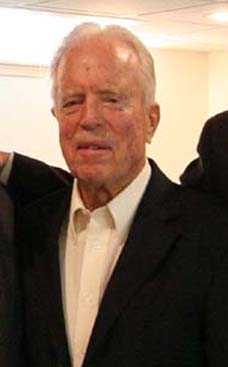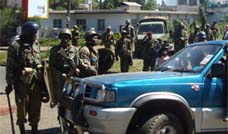
Europe is boosting its common diplomatic corps, while China is deploying retired civil servants, prison laborers and Chinese teachers — all are what the historian Arnold Toynbee called marchmen, the foot-soldiers of empire spreading values and winning loyalty. There are currently more musicians in U.S. military marching bands than there are Foreign Service officers, a fact not helped by Congress’s decision to effectively freeze growth in diplomatic postings. In this context, Condoleezza Rice’s “transformational diplomacy” is a myth: we don’t have enough diplomats for core assignments, let alone solo hardship missions. We need a Peace Corps 10 times its present size, plus student exchanges, English-teaching programs and hands-on job training overseas — with corporate sponsorship.
Parag Khana writes: We need a Peace Corps 10 times its present size
Waving Goodbye to Hegemony
By PARAG KHANNA
Turn on the TV today, and you could be forgiven for thinking it’s 1999. Democrats and Republicans are bickering about where and how to intervene, whether to do it alone or with allies and what kind of world America should lead. Democrats believe they can hit a reset button, and Republicans believe muscular moralism is the way to go. It’s as if the first decade of the 21st century didn’t happen — and almost as if history itself doesn’t happen. But the distribution of power in the world has fundamentally altered over the two presidential terms of George W. Bush, both because of his policies and, more significant, despite them. Maybe the best way to understand how quickly history happens is to look just a bit ahead.
It is 2016, and the Hillary Clinton or John McCain or Barack Obama administration is nearing the end of its second term. America has pulled out of Iraq but has about 20,000 troops in the independent state of Kurdistan, as well as warships anchored at Bahrain and an Air Force presence in Qatar. Afghanistan is stable; Iran is nuclear. China has absorbed Taiwan and is steadily increasing its naval presence around the Pacific Rim and, from the Pakistani port of Gwadar, on the Arabian Sea. The European Union has expanded to well over 30 members and has secure oil and gas flows from North Africa, Russia and the Caspian Sea, as well as substantial nuclear energy. America’s standing in the world remains in steady decline.
Why? Weren’t we supposed to reconnect with the United Nations and reaffirm to the world that America can, and should, lead it to collective security and prosperity? Indeed, improvements to America’s image may or may not occur, but either way, they mean little. Condoleezza Rice has said America has no “permanent enemies,” but it has no permanent friends either. Many saw the invasions of Afghanistan and Iraq as the symbols of a global American imperialism; in fact, they were signs of imperial overstretch. Every expenditure has weakened America’s armed forces, and each assertion of power has awakened resistance in the form of terrorist networks, insurgent groups and “asymmetric” weapons like suicide bombers. America’s unipolar moment has inspired diplomatic and financial countermovements to block American bullying and construct an alternate world order. That new global order has arrived, and there is precious little Clinton or McCain or Obama could do to resist its growth.
[Excerpt]
Less Can Be More
So let’s play strategy czar. You are a 21st-century Kissinger. Your task is to guide the next American president (and the one after that) from the demise of American hegemony into a world of much more diffuse governance. What do you advise, concretely, to mitigate the effects of the past decade’s policies — those that inspired defiance rather than cooperation — and to set in motion a virtuous circle of policies that lead to global equilibrium rather than a balance of power against the U.S.?
First, channel your inner J.F.K. You are president, not emperor. You are commander in chief and also diplomat in chief. Your grand strategy is a global strategy, yet you must never use the phrase “American national interest.” (It is assumed.) Instead talk about “global interests” and how closely aligned American policies are with those interests. No more “us” versus “them,” only “we.” That means no more talk of advancing “American values” either. What is worth having is universal first and American second. This applies to “democracy” as well, where timing its implementation is as important as the principle itself. Right now, from the Middle East to Southeast Asia, the hero of the second world — including its democracies — is Lee Kuan Yew of Singapore.
We have learned the hard way that what others want for themselves trumps what we want for them — always. Neither America nor the world needs more competing ideologies, and moralizing exhortations are only useful if they point toward goals that are actually attainable. This new attitude must be more than an act: to obey this modest, hands-off principle is what would actually make America the exceptional empire it purports to be. It would also be something every other empire in history has failed to do.
Second, Pentagonize the State Department. Adm. William J. Fallon, head of Central Command (Centcom), not Robert Gates, is the man really in charge of the U.S. military’s primary operations. Diplomacy, too, requires the equivalent of geographic commands — with top-notch assistant secretaries of state to manage relations in each key region without worrying about getting on the daily agenda of the secretary of state for menial approvals. Then we’ll be ready to coordinate within distant areas. In some regions, our ambassadors to neighboring countries meet only once or twice a year; they need to be having weekly secure video-conferences. Regional institutions are thriving in the second world — think Mercosur (the South American common market), the Association of Southeast Asian Nations (Asean), the Gulf Cooperation Council in the Persian Gulf. We need high-level ambassadors at those organizations too. Taken together, this allows us to move beyond, for example, the current Millennium Challenge Account — which amounts to one-track aid packages to individual countries already going in the right direction — toward encouraging the kind of regional cooperation that can work in curbing both terrorism and poverty. Only if you think regionally can a success story have a demonstration effect. This approach will be crucial to the future of the Pentagon’s new African command. (Until last year, African relations were managed largely by European command, or Eucom, in Germany.) Suspicions of America are running high in Africa, and a country-by-country strategy would make those suspicions worse. Finally, to achieve strategic civilian-military harmonization, we have to first get the maps straight. The State Department puts the Stans in the South and Central Asia bureau, while the Pentagon puts them within the Middle-East-focused Centcom. The Chinese divide up the world the Pentagon’s way; so, too, should our own State Department.
Third, deploy the marchmen. Europe is boosting its common diplomatic corps, while China is deploying retired civil servants, prison laborers and Chinese teachers — all are what the historian Arnold Toynbee called marchmen, the foot-soldiers of empire spreading values and winning loyalty. There are currently more musicians in U.S. military marching bands than there are Foreign Service officers, a fact not helped by Congress’s decision to effectively freeze growth in diplomatic postings. In this context, Condoleezza Rice’s “transformational diplomacy” is a myth: we don’t have enough diplomats for core assignments, let alone solo hardship missions. We need a Peace Corps 10 times its present size, plus student exchanges, English-teaching programs and hands-on job training overseas — with corporate sponsorship.
That’s right. In true American fashion, we must build a diplomatic-industrial complex. Europe and China all but personify business-government collusion, so let State raise money from Wall Street as it puts together regional aid and investment packages. American foreign policy must be substantially more than what the U.S. government directs. After all, the E.U. is already the world’s largest aid donor, and China is rising in the aid arena as well. Plus, each has a larger population than the U.S., meaning deeper benches of recruits, and are not political targets in the present political atmosphere the way Americans abroad are. The secret weapon must be the American citizenry itself. American foundations and charities, not least the Gates and Ford Foundations, dwarf European counterparts in their humanitarian giving; if such private groups independently send more and more American volunteers armed with cash, good will and local knowledge to perform “diplomacy of the deed,” then the public diplomacy will take care of itself.
Fourth, make the global economy work for us. By resurrecting European economies, the Marshall Plan was a down payment on even greater returns in terms of purchasing American goods. For now, however, as the dollar falls, our manufacturing base declines and Americans lose control of assets to wealthier foreign funds, our scientific education, broadband access, health-care, safety and a host of other standards are all slipping down the global rankings. Given our deficits and political gridlock, the only solution is to channel global, particularly Asian, liquidity into our own public infrastructure, creating jobs and technology platforms that can keep American innovation ahead of the pack. Globalization apologizes to no one; we must stay on top of it or become its victim.
Fifth, convene a G-3 of the Big Three. But don’t set the agenda; suggest it. These are the key issues among which to make compromises and trade-offs: climate change, energy security, weapons proliferation and rogue states. Offer more Western clean technology to China in exchange for fewer weapons and lifelines for the Sudanese tyrants and the Burmese junta. And make a joint effort with the Europeans to offer massive, irresistible packages to the people of Iran, Uzbekistan and Venezuela — incentives for eventual regime change rather than fruitless sanctions. A Western change of tone could make China sweat. Superpowers have to learn to behave, too.
Taken together, all these moves could renew American competitiveness in the geopolitical marketplace — and maybe even prove our exceptionalism. We need pragmatic incremental steps like the above to deliver tangible gains to people beyond our shores, repair our reputation, maintain harmony among the Big Three, keep the second world stable and neutral and protect our common planet. Let’s hope whoever is sworn in as the next American president understands this.
Parag Khanna is a senior research fellow in the American Strategy Program of the New America Foundation. This essay is adapted from his book, “The Second World: Empires and Influence in the New Global Order,” to be published by Random House in March.










